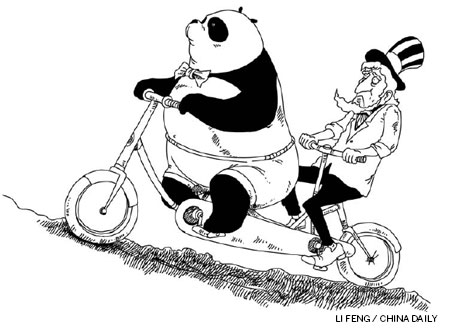Change drives China-US talks
Updated: 2013-07-17 09:54
By Dan Steinbock (China Daily)
|
||||||||
Although many jaded US political observers say the S&ED has become unwieldy and excessively process-oriented, the reality is that things are changing. The operating environment of the US-China talks is shifting toward multipolarity - as proven by a slate of proposed regional trade deals and the cybersecurity debate.
US-China dialogue rests on strategic and economic tracks. The former covers vital security issues, such as Chinese military modernization, maritime disputes in Asia, US strategic pivot to Asia, bilateral military-to-military relationship, Iran's nuclear program and the denuclearization of the Korean Peninsula. It also includes cross-Straits relations and US arms sales to Taiwan.
In cybersecurity, former National Security Agency contractor Edward Snowden's expos of the US surveillance program created a storm in both countries, as well as the rest of the world, and severely harmed US credibility. In China, many political analysts say that, after the popularity of the Barack Obama administration began to fall, it became more vocal in alleging that China had violated cybersecurity.

Now China, along with other BRICS member states and Germany, accuses the US and US-based interests of violating cybersecurity. It also accuses the NSA of having cozy relationships with the largest US-based Internet giants, from Google to Microsoft, saying they should be commercial companies rather than extensions of the government's intelligence wing.
Not surprisingly, the inaugural session of the highly anticipated US-China bilateral working group on cybersecurity preceded the S&ED meeting, enabling both sides to insulate the Strategic and Economic Dialogue from the cybersecurity flames.
In the ultimate analysis, though, cybersecurity is a global challenge and requires multipolar cooperation.
The S&ED focused on economic issues, including China's reforms, bilateral trade deficit, innovation policies and intellectual property rights, the US' quantitative easing (QE) and China's currency policy, US Treasuries held by China and global trade issues.
The Bilateral Investment Treaty talks rep

 Panama finds 'missile equipment' aboard DPRK ship
Panama finds 'missile equipment' aboard DPRK ship
 Free on his feet
Free on his feet
 Extreme heat causing vehicle fires
Extreme heat causing vehicle fires
 Men, you look good in slim elegant cut
Men, you look good in slim elegant cut
 Luxury dresses in plastic
Luxury dresses in plastic
 Obama urges restraint amid protests
Obama urges restraint amid protests
 Putin wants Snowden to go, but asylum not ruled out
Putin wants Snowden to go, but asylum not ruled out
 Apple to probe death of Chinese using charging iPhone
Apple to probe death of Chinese using charging iPhone
Most Viewed
Editor's Picks

|

|

|

|

|

|
Today's Top News
Asiana crash passengers sue Boeing
Li highlights economic restructuring
Merkel's rivals go on attack over US spying
'Missile equipment' found aboard DPRK ship
Egypt's interim govt takes oath
Gay marriage to be legal in UK
China signs cooperation agreements with Belarus
Philippines' accusation refuted
US Weekly

|

|






